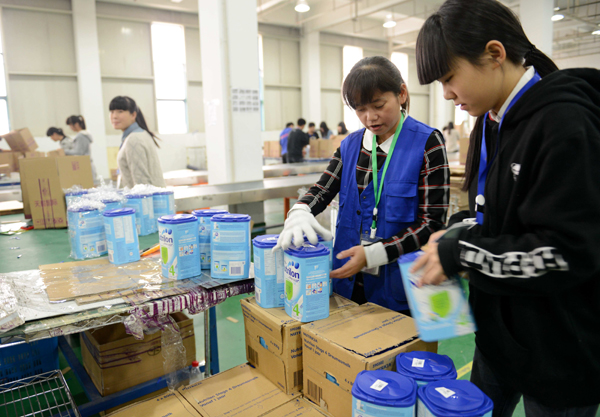New tariff policy for cross-border e-businesses adopted too hastily
(China Daily) Updated: 2016-04-11 07:30
 |
|
Overseas goods sold on Tmall, the online marketplace, being packed for shipment in China at the Hangzhou Cross-border Trade E-commerce Industrial Park on Tuesday. [Provided to China Daily] |
Since Friday, China has been implementing new, mostly higher, tariff rates on cross-border retail purchases. But the implementation of the change was too quick, says Beijing News:
The low tariff rates that small overseas purchasing agents used to enjoy are now gone. Many analysts emphasize that although the new tariffs increase the burden on enterprises and consumers they still have some positive aspects because they can increase the government's financial revenue and make the market fairer for giant cross-border retail businesses.
However, the adjustment of the tariff rates came in such a hurry that trouble has been caused to enterprises and consumers, even certain customs. For example, many bonded zones were not prepared so they had to suspend some orders by consumers; in Zhengzhou tax exempt zone, for example, everything almost fell into chaos, according to reports.
That should arouse our concern and provide a lesson for the authorities to learn from.
First, before drafting the new tariff policy, the authorities should have made a thorough investigation into the online retail business, such as the goods stored in tax exempt zones and the time enterprises would need to adjust their computing systems. On the basis of such an investigation, they should have left a buffer period before implementing the new policy.
Second, a hearing should have been held, to which representatives from online retail businesses and consumers should have been invited. Only by taking into account their opinions could the new policy be truly welcome.
Currently China is accelerating its comprehensive reform and one new policy after another will be implemented. Ministries and other authorities need to be especially cautious before taking any move, because any mistake might lead to unnecessary inconvenience for some people.

I’ve lived in China for quite a considerable time including my graduate school years, travelled and worked in a few cities and still choose my destination taking into consideration the density of smog or PM2.5 particulate matter in the region.











